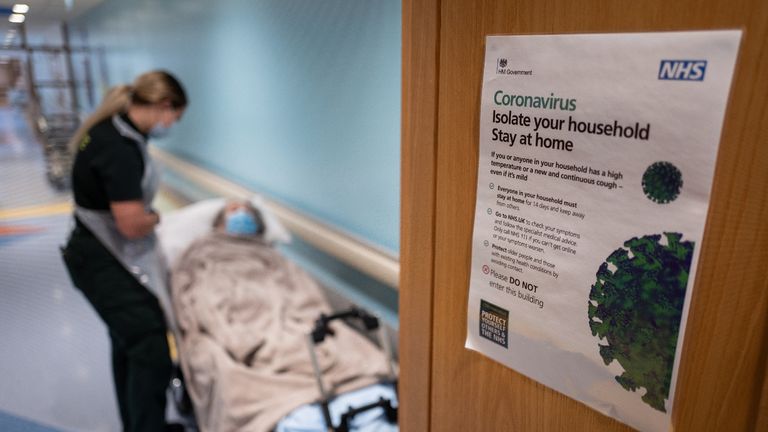Hospitals are under such pressure from an influx of people with coronavirus that some patients are being treated in ambulances - and one medical expert has warned the vaccine rollout could take until December next year.
The number of people being admitted to hospital is nearing the level of the first peak in April and the problem could continue to get worse through January and February, it has been warned.
One ambulance service has reported that Boxing Day was one of its busiest ever days.
Dr Adrian Boyle, from the Royal College of Emergency Medicine, told Sky News the situation is "very tough" and added that the problem was particularly acute in London but "this could easily spread".
He said: "Ambulances keep coming in - we are desperate to offload ambulances, that's always been a priority for us… and you feel terrible and a sense of helplessness when you can't… because your emergency department is full."
Speaking about the next two months, he said they are "going to be really tough" with the number of patients continuing to rise.
"Vaccinations are not going to make much of an impact on that just yet, it's going to take a bit longer to start denting that," he said.
There were 21,286 people in hospital with coronavirus in the UK on 22 December, the last day for which government figures are available.
This is only slightly less than the 21,683 patients recorded on 12 April.
Meanwhile, a medical expert has told Sky News that the vaccine developed by Oxford University and AstraZeneca will not bring changes to life in the UK for some time yet.
Dr Bharat Pankhania, a senior clinical lecturer at the University of Exeter, said: "It will still take about 50 weeks to immunise 50 million people."
He said the vaccine "will be the one that allows us to immunise a lot of people in a short period of time".
And he added: "It is also easier to give and therefore you can carry it to nursing homes where people cannot come to the immunising centre."
But to get it rolled out across the country the government should consider opening vaccination stations 24 hours a day.
That could "cut the time taken to immunise a large part of the UK population by half - from 50 weeks to 25 weeks," he said.
"It can be done. We're an affluent nation, we've got the logistics, the skills to do these things."
The jab, which unlike the Pfizer one does not have to be stored at ultra low temperatures, could be approved by regulators for use in the coming days.
Dr Pankhania also dismissed reports that the UK could be free of lockdowns by February if the Oxford vaccine is rapidly deployed.
He said: "How are you going to immunise so many people by February in the midst of an apparently more infectious strain and rising case numbers? If you're going to achieve that you need to double-up, triple-up on the immunisation process when the vaccine is licensed."
The London Ambulance Service said Boxing Day was one of its "busiest ever days", with 7,918 calls - up by more than 2,500 compared with the same day in 2019.
The numbers were so high that the service was forced to get help from other services across the South.
Sky's Sadiya Chowdhury, reporting from outside the Queen's Hospital in Romford, Greater London said patients there were being treated inside ambulances "because they don't have enough beds left - that's how bad the situation is".
And a consultant at Southampton general hospital told The Guardian of a "scary" situation with a big rise in COVID cases.
They said: "Our general intensive care unit footprint is now completely overfull of COVID patients.
"We have expanded our ICU by 10 extra beds to take ICU patients from both Portsmouth and Kent as they are so hard-pressed. [The situation] is under control so far but unpleasant and scary."
Health service chiefs have warned NHS care providers nationally that they should continue to "plan on the basis that we will remain in a level four incident for at least the rest of this financial year [until early April] and NHS trusts should continue to safely mobilise all of the available surge capacity over the coming weeks".
There are also signs of stress in Wales, as a surgeon there warned that life-saving care for non-COVID patients was under threat if critical care units continued to fill up.
Shakir Mustafa, a consultant surgeon at the Cwm Taf University Health Board, told Sky News critical care units across South Wales were reaching capacity.
On Sunday, the government said a further 316 people had died within 28 days of testing positive for COVID-19, bringing the UK total to 70,752.
As of 9am on Sunday, there had been a further 30,051 lab-confirmed coronavirus cases.
However, Scotland is not releasing death figures between 24 and 28 December and Northern Ireland is not releasing case or death figures during the same period.
It comes as more than 24 million people - or 43% of the population - are in England's highest level of restrictions.
Scotland is also in Level 4 restrictions, a stay-at-home order is in place across Wales, and Northern Ireland is in a six-week lockdown.
https://news.google.com/__i/rss/rd/articles/CBMiigFodHRwczovL25ld3Muc2t5LmNvbS9zdG9yeS9jb3ZpZC0xOS1ob3NwaXRhbC1hZG1pc3Npb25zLW5lYXItZmlyc3QtcGVhay1hcy1kb2N0b3Itd2FybnMtZnVsbC11ay12YWNjaW5lLXJvbGxvdXQtY291bGQtdGFrZS1hLXllYXItMTIxNzM5ODjSAY4BaHR0cHM6Ly9uZXdzLnNreS5jb20vc3RvcnkvYW1wL2NvdmlkLTE5LWhvc3BpdGFsLWFkbWlzc2lvbnMtbmVhci1maXJzdC1wZWFrLWFzLWRvY3Rvci13YXJucy1mdWxsLXVrLXZhY2NpbmUtcm9sbG91dC1jb3VsZC10YWtlLWEteWVhci0xMjE3Mzk4OA?oc=5
2020-12-28 13:39:48Z
52781272270504

Tidak ada komentar:
Posting Komentar